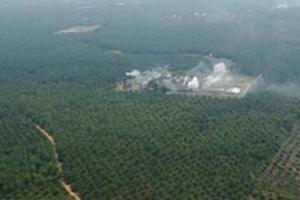Biofuels are flavour of the month for car-makers and politicians keen to be seen as green without directly addressing the problem of ever-rising transport emissions. The buzz has also caught on strongly in the EU. On 10 January, the European Commission presented its new energy and biofuels blueprint. It can be summed up in just seven words: bad news for people and the climate.
Large-Scale Tree Plantations
Industrial tree plantations are large-scale, intensively managed, even-aged monocultures, involving vast areas of fertile land under the control of plantation companies. Management of plantations involves the use of huge amounts of water as well as agrochemicals—which harm humans, and plants and animals in the plantations and surrounding areas.
Bulletin articles
26 February 2007
Bulletin articles
26 February 2007
The present eagerness of the European Union to favour the use and import of biofuel as an alternative to fossil fuels has risen serious concerns among those who are aware that global warming should be tackled globally and demand drastic changes in the current Western consumer, commercial and production patterns.
Other information
26 February 2007
The Veracel pulp mill is located in the south of the Brazilian state of Bahia, some 45 kilometres from the coast, on the border between the municipalities of Eunapolis and Belmonte. Veracel is a corporation in which the Swedish-Finnish group Stora Enso and the Brazilian Aracruz group have equal shares, today managing one of the world’s largest eucalyptus plantation and industrialization projects.
Other information
26 February 2007
According to the FAO definition, rubber plantations are “forests.” Recently we visited one of these “forests” in Kribi, Cameroon and talked with the workers and local population. Unlike the FAO “experts,” nobody, absolutely nobody there perceives these plantations as forests.
Other information
26 February 2007
Kenyan winner of the 2004 Nobel Peace Prize, and also Deputy Minister for the Environment and Natural Resources and Member of Parliament, Wangari Maathai, launched in 1977 the Green Belt Movement, which spread from Kenya across Africa.
Other information
26 February 2007
For decades, the presence of communist insurgents kept Malaysia’s northern frontier free from exploitation. Too dangerous to open up for tourism or development, the Belum-Temenggor forest stood in pristine splendour as the nation built superhighways and superstructures, and extracted timber from other forests.
Other information
26 February 2007
Vietnam's paper industry is booming. In 1995, paper production stood at 220,000 tonnes. In 2007, the Vietnam Paper Association aims to produce more than one million tonnes of paper. Demand far exceeds supply and in 2006, Vietnam imported 709,000 tonnes of paper products. A large proportion of paper produced is for packaging - a result of Vietnam's expanding export economy.
Bulletin articles
26 February 2007
Costa Rica has been built as an export-oriented economy, with no political or economic independence. Export pressure on resources by the world system resulted in great inequality. Since the Kyoto Protocol, neoliberals have redefined forests as ‘oxygen generators’, a concept that Costa Rica has embraced. In this framework, local communities, especially those living in the tropical rainforests and depending for survival on the bounty provided by the forests, have seen undermined their basic support system.
Other information
29 January 2007
The notion of High Conservation Value Forest was originally developed as a key principle within the revised standard of the Forest Stewardship Council issued in 1999. However guidance on how such forests should be identified was scarce and not well consolidated. In 2002, the conservation organisation WWF and the retail company IKEA, as part of a three-year cooperative programme, decided to fund a small project to develop guidance on how HCVF should be defined, identified and managed.
Bulletin articles
29 January 2007
The HCVF concept has been applied in Indonesia over the last five years in attempts to identify and protect high conservation value forests from conversion to pulp wood plantations. APP and APRIL, the two largest pulp producers in Indonesia, have both responded to market pressure orchestrated by WWF and Friends of the Earth affiliates by conducting and commissioning HCVF assessments in forest areas planned for conversion to Acacia plantations.
Other information
26 January 2007
Open letter to the European Parliament, the European Commission, the governments and citizens of the European Union
Sawit Watch. Bogor, 26 January 2007
Bulletin articles
29 December 2006
Large-scale rubber, oil palm, eucalyptus and pine tree plantations are being promoted by governments in Cambodia, China, Laos, Thailand and Vietnam. However, affected villagers are openly protesting against them. At a meeting held last month in Cambodia we learned that local communities are strongly opposing these plans because they see that these plantations are encroaching on their lands and impacting on their livelihoods.

